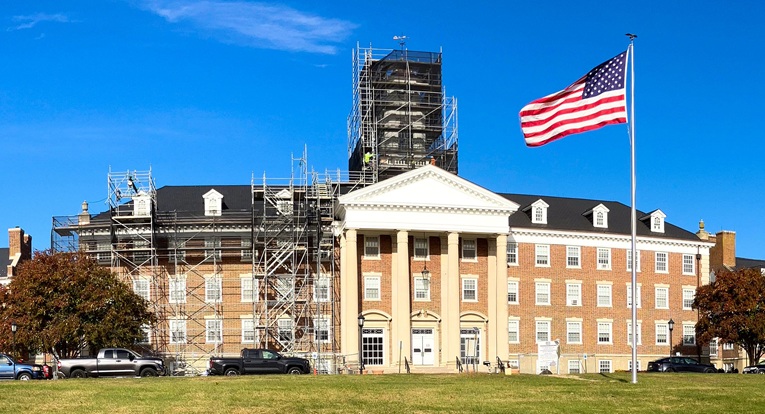The ongoing process to determine how to spend $21 million in American Rescue Plan Act (ARPA) funding was raised several times during Greenbelt City Council’s April 11 meeting. Initially, Greenbelt Station residents spoke during Petitions and Requests, describing a lack of amenities in their housing development like recreation, community spaces and shopping. They raised ideas such as purchasing the Prince George’s Scrap facility on Branchville Road, then investing in soil and groundwater remediation needed to convert it to recreation facilities. (The property appears to be on unincorporated land just outside Greenbelt city limits.) Franklin Park residents highlighted their ongoing need for additional rental assistance. All community ideas must be submitted by Friday, April 15 to be analyzed by Raftelis, the consulting group engaged by the city to coordinate public input, for their report to council’s May 10 ARPA Redocumentation Discussion worksession, and ultimately considered for the next annual budget starting July 1.
Acting City Manager Tim George reported the community’s engagement with the website engagegreenbelt.org far exceeded Raftelis’ predictions with over 2,130 hits. Additionally, residents have submitted 287 surveys and about 10 emails to the city. While only 34 individuals attended in-person sessions, George reported these sessions, along with focus groups with businesses, faith-based and other support groups, elicited valuable input.
Council then turned to Greenbelt CARES Director Dr. Elizabeth Park for an update on ARPA assistance provided to date. Park estimated up to 60 people remain on the waitlist from the city’s ARPA housing and utility assistance that closed in 2021. These applications are being processed in batches to accurately manage rental assistance funds. Park and Mayor Emmett Jordan clarified the Prince George’s County eviction process. The district court issues a writ, the county sheriff carries out the eviction, the property manager is responsible for sending eviction notices and judges can exercise an option to stay an eviction if a rental assistance application is in process.
Park and council discussed details for various city and county rental assistance programs. The county Emergency Rental Assistance Program (ERAP) limits applicants to 18 months of support, while Greenbelt ARPA funds are limited to $10,000 per applicant, have income limits and require proof of Covid-related hardship. Resident Bill Orleans then asked if remaining funds could be used to prevent immediate evictions, and what city staff might do differently in these urgent cases, saying, “This pandemic did not cause more streets to need to be repaved but it did cause a need to help residents who lost work, who had health problems and other human needs.” Park described county services related to imminent evictions, such as same-day services at the courthouse, and Jordan highlighted the city’s non-ARPA assistance programs. Councilmember Judith Davis added, “People have to understand there are certain rules, policies and procedures that need to be followed.”
In response to the recitation of procedures, a Franklin Park resident described her impending eviction notice with a date of April 18. The resident was referred to CARES and legal services. Park emphasized the benefits of community legal services and that an eviction cannot happen without appropriate judicial proceedings. Councilmember Kristen Weaver relayed resident Michael Hartman’s online question that if council discovers a small group in need, would there be any chance of helping them or do they just go on a waitlist? Jordan asked that Greenbelt CARES contact information be announced as a resource for everyone in attendance.
Council’s enthusiasm and urgency then rallied as they congratulated and thanked Greenbelt Station and Franklin Park residents for participating that night. Councilmembers encouraged Greenbelt West attendees to consider volunteering for advisory boards and meetings, after which the audience filed out.
Later, council’s agenda turned to the final planned ARPA discussion of the evening: whether or not the city should use the option of a standard allowance of up to $10 million in the ARPA lost revenue category instead of itemized accounting. Councilmember Colin Byrd was concerned the $9.5-million estimate of lost revenue through the standard allowance overstated actual losses and staff committed to sharing detailed calculations with council. This standard allowance has been much discussed with the Haverty Group, hired by the state of Maryland to assist in ARPA administration, and also with nearby municipalities, the Maryland Municipal League, and the National League of Cities – there is general relief that the standard allowance eases complex reporting requirements. Weaver explained several times, “The standard allowance does not determine how Greenbelt City Council will decide to spend funds, it’s just that it allows for more flexibility in reporting requirements.” She emphasized council will still need to make the best choices about how to spend all remaining funds for the benefit of Greenbelters. City staff and council discussed potential projects recommended by the city, and Byrd emphasized funds should be spent on issues resulting from the pandemic, as opposed to capital or replacement projects.
City Treasurer Bertha Gaymon explained the fast-approaching deadline. The city must decide by its April 30 report whether to use the standard allowance or prepare a detailed itemized lost revenue calculation. Council ultimately passed a unanimous motion directing city staff to use the standard allowance.



